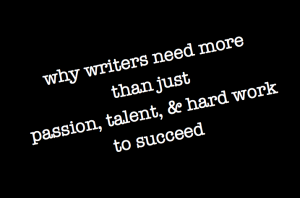 My students and I are discussing Malcolm Gladwell’s Outliers in class. Well, as you know, teachers can’t just read the book they must find ways to teach its lessons, drive home its themes, and apply it to their students’ lives. In this case, understanding all the complex components that shape and determine success. And naturally, as a writer I can’t help but apply these same concepts to the writing process.
My students and I are discussing Malcolm Gladwell’s Outliers in class. Well, as you know, teachers can’t just read the book they must find ways to teach its lessons, drive home its themes, and apply it to their students’ lives. In this case, understanding all the complex components that shape and determine success. And naturally, as a writer I can’t help but apply these same concepts to the writing process.
To really succeed at writing you need more than just passion, talent, and hard work. Other factors come into play, some absolutely positively out of your control.
The world we inhabit helps us succeed. Are you surrounding yourself with people who lift you up, encourage you, share your successes and failures? That might mean finding a supportive group of friends, writers or not. Do they value reading? Is your community ( home, Facebook friends, writing clubs, critique groups ) helping or hindering.
The Matthew Effect. It’s having some kind of advantage ( be it socio economic status, natural ability, or birthdate ) that reaps more opportunities based on the advantage. For example the smarter students get the better teachers and more opportunities for gifted programs. Older, bigger children enrolled in sports get more playing time and more coaching. The advantage accumulates. Is it fair? No. But nobody ever said the world was fair, did they? How does this apply to writers? Some writers don’t come from privileged backgrounds, or hold degrees or MFA’s from prestigious institutions. Maybe you don’t come from a home where grammatically correct English is spoken, don’t have books in the house, and/or never went to the public library. For those writers, you’re going to have to invest a whole of time and energy to come up to par.
The 10,000 rule. You must invest enough time and energy to become really good at something. It takes 10,000 hours or about 10 years. Practice practice practice. This ought to give writers hope. And it also ought give the wanna-be’s a kick in the novel pants. If you love to write then 10,000 hours is not an arduous task. It’s your greatest pleasure. And no, maybe you still don’t become the best writer but you’ll become better than most. So whether you apply this rule to crafting sentences and plot, or writing queries it should give you hope. Improvement will happen with practice. Don’t forget, good writers are also great readers. I also suggest 10,000 hours of reading as well. So, get crackin’! You have stuff to do!!
Trouble with Geniuses part 1 and 2: Gladwell sums up these chapters in a way that gives us hope. You only have to be smart enough to succeed. Apply this to writing and it means most of us have the smarts to write a great novel. Add in a vivid imagination and that stacks our novel deck even more. Begin smart enough and having a “fertile mind” ( Gladwell 89) is just one key to success. People smarts and street savvy are important too. Gladwell writes a whole lot more on the subject but this isn’t a book review.
Lessons from Joe Flom: Culture, demographic luck, and meaningful work are other important factors of success. Let’s apply this to writing.
Culture: Did you come from a home that values reading and creativity? Determination and perseverance? It sure will be easier to follow your writing dream if you come from a family who valued and fostered these traits. More points for parent role models. Bonus points for graduating from a university with a strong writing program, author-professors, and a kick-ass writing club.
Demographic luck sucks! We can’t change where we live, our birth year, or when we decided to begin writing but these factors do matter. Sadly ( or maybe not ) this is a time of tremendous change for a publishing world glutted with manuscripts, decreasing book stores, and a zillion self-publishing options. Whether this works against you or for you is something that’s much debated on blogs and in the industry.
Writing is meaningful if it has 3 things: “autonomy, complexity, and connection between effort and reward…It is not how much money we make that ultimately makes us happy between nine and five. It’s whether our work fulfills us.” ( Gladwell 149-150 ). Many writers already have a job or career so our writing time ought to be really really really meaningful—meaningful enough to see us through lots of rejections and disappointments—meaningful enough to help us weather not landing an agent ( yet ), score a publishing contract ( yet ), or sell a single self-published book ( yet ).
Whether this infuriates you or gives you hope or is a bit of both, it’s good to understand that it takes a whole lot more than we think to become a successful writer. If you’re attempting to break into the writing world it helps to do it with both eyes open ( and fingers crossed )!
I’d love to hear and share your thoughts and experiences!
Part 2 next week!
Related posts: Readin’ & Writin‘; Rock Your Writing















I really enjoyed Outliers, but it also scared the sh*t out of me because it pointed out in which ways I was disadvantaged, and that paralyzed me for a bit. How would I catch up to others with a privileged head start? But like you said, it just takes time. So I won’t be super successful in my 20s, or even my 30s, but by my 40s I will have racked up those hours and should be rocking it! At least that’s the plan. 😉
I just read an article stating that the best writing ( and receiving literary awards ) doesn’t occur until a person is older and has more life experiences. So score another one for the late-bloomers! I wish I had gotten a a minor in creative writing or gone into the publishing field but waaaaaay back when my folks thought getting a business degree was what every one should do ( actually getting your Mrs. degree was more important).
You have a plan! That’s more than many writers! Write on, sister!